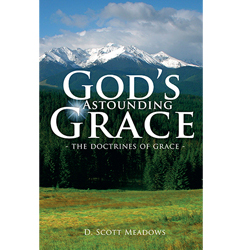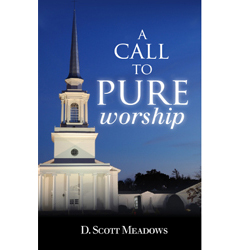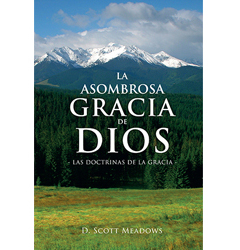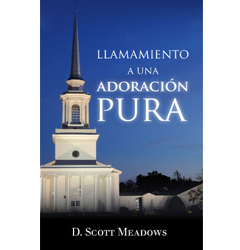

“What Think Ye of Christ?”
D. Scott Meadows
“What think ye of Christ?” —Matthew 22.42
The great test of your soul’s health is, What think you of Christ? Is he to you “fairer than the children of men”—“the chief among ten thousand”—the “altogether lovely”? Wherever Christ is thus esteemed, all the faculties of the spiritual man exercise themselves with energy. I will judge of your piety by this barometer: does Christ stand high or low with you? If you have thought little of Christ, if you have been content to live without his presence, if you have cared little for his honour, if you have been neglectful of his laws, then I know that your soul is sick—God grant that it may not be sick unto death! But if the first thought of your spirit has been, how can I honour Jesus? If the daily desire of your soul has been, “O that I knew where I might find him!” I tell you that you may have a thousand infirmities, and even scarcely know whether you are a child of God at all, and yet I am persuaded, beyond a doubt, that you are safe, since Jesus is great in your esteem. I care not for thy rags, what thinkest thou of his royal apparel?
I care not for thy wounds, though they bleed in torrents, what thinkest thou of his wounds? are they like glittering rubies in thine esteem? I think none the less of thee, though thou liest like Lazarus on the dunghill, and the dogs do lick thee—I judge thee not by thy poverty: what thinkest thou of the King in his beauty? Has he a glorious high throne in thy heart? Wouldest thou set him higher if thou couldest? Wouldest thou be willing to die if thou couldest but add another trumpet to the strain which proclaims his praise?
Ah! then it is well with thee. Whatever thou mayest think of thyself, if Christ be great to thee, thou shalt be with him ere long.
“Though all the world my choice deride,
Yet Jesus shall my portion be;
For I am pleased with none beside,
The fairest of the fair is he.”
—C. H. Spurgeon, Morning and Evening, 29 December PM
Elaboration
The structure of this devotional message
I. A Test of Your Piety
• Your esteem of Christ is a test of your soul’s health
• Little esteem of Him is a symptom of a sick soul
• Great esteem of Him is a mark of spiritual vitality
II. Questions for Reflection. Despite low thoughts of yourself (rags, wounds, poverty), what do you think of His:
• Royal apparel?
• His glittering rubies (i.e., His wounds)?
• His majestic beauty?
• His glorious high throne—would you raise it higher?
• His praise—would you make it louder?
III. Hope for the Future
• If Christ is great to you, you will be with Him soon
• Quatrain message: By faith I choose Jesus as the fairest of all, even though the world ridicules me for it
On Matthew 22.42
Being challenged by the Pharisees and Sadducees and effectively silencing them (Matt 22.15-39; cf. 34), Jesus asked this question (42) to drive home the point that the OT Messiah was not only King David’s son (human descendant in the line of Jewish kings), but also King David’s Lord (i.e., God worshipped by David). Jesus asked them if Messiah is David’s son, how is he also his Lord, as David says in Psalm 110.1? This question stumped the Pharisees, but Christians have answered with the doctrine of the Incarnation and its hypostatic union of the human and divine natures in one person—Jesus Christ our Lord.
Spurgeon adapts the biblical question for another use, assuming our orthodoxy as professing Christians. We all recognize the Messiah as truly man and truly God, but do we truly love and worship Him? The reality of such love and reverence toward Christ distinguishes us as Christians (Eph 6.24), but even true Christians esteem Him more or less. Spurgeon drives at this as a real indicator of our spiritual condition, whether it is better or worse (n.b., “your soul’s health,” “energy,” “piety,” “barometer,” “your soul is sick,” etc.). Spurgeon’s overall thrust is encouragement for Christians who think much of Christ and yet are struggling with assurance of salvation. You would not esteem Him highly and worship Him as you do if you were not saved and guaranteed a glorious destiny of full salvation with Christ!
Reflection
Spurgeon picks up on the verb “think” in his biblical text and makes repeated use of it in his questions to the reader. The Greek word translated “think” pertains to one’s “belief” (BDAG) or “opinion” (LTW) about something, one’s sincere thought or judgment about something or someone. We all know that we are supposed to think of Christ as Spurgeon says, but do we? Do we really? How may we know this?
We know this in many ways familiar to Christians at our best. If we sincerely esteem Christ very highly, we find ourselves often thinking of Christ on purpose in Scripture reading, prayer, and meditation, and it will be our pleasure to do so. We also will value church meetings largely because they help focus our attention upon Christ by the elements of worship like preaching, prayer, and the Lord’s Supper. Hymns will be cherished for Christ’s sake, as mainly about Christ. We will enjoy speaking about Christ with fellow Christians, and we won’t be able to help speaking about Christ sometimes even to unbelievers.
If these evidences of Christ-esteem are sparse in our actual experience, then we may fairly conclude that our actual Christ-esteem is not especially great. As long as we do truly esteem Him, we should not despair. Rather, we should take heart at His grace in us and prayerfully depend on Him for its increase. Our attendance upon the means of grace must be deliberate and hopeful, and with His blessing, we will flourish spiritually. Ω
All Rights Reserved. Used with permission. No part of this article may be used or reproduced in any manner whatsoever or translated without written permission.
The following books by D. Scott Meadows are available at Trinity Book Service and Cristianismo Histórico:
Ebook: A Call to Pure Worship | D. Scott Meadows




